The 11 Best Cheap Metal Detectors [Updated for 2022]
Published by Carolyn Yohannes on 01/01/21
There are so many options when it comes to purchasing a new metal detector. Where do you start? The first step to figuring out what metal detector is best for you is deciding on a budget. Many people who are beginners decide they want to start off with a low-budget, cheap metal detector and work up from there. Although they are referred to as cheap metal detectors, these detectors can offer great quality and performance.
It all depends on what you plan on detecting. If you’re just getting started in the metal detecting world, these affordable options are perfect. As a beginner, you may not want all the bells and whistles some of the higher-end machines have. On the other hand, you want one that works well and leads you to treasure! Both beginners and pros alike can benefit from recommendations.
Different metal detectors are better at some things than others. In essence, metal detecting is easy — wave the search coil over the ground and dig when it beeps! Unfortunately, the “dig everything that beeps” approach can lead to a lot of needless digging, missed targets, and a mountain of pop tabs.
If you’re looking specifically for gold, for example, you’ll want a completely different detector than if you were scuba diving or metal detecting on a beach.
All-purpose entry-level machines cannot detect small gold nuggets or flakes, but they will find enough coins, jewelry, and relics to keep a beginner busy and enthusiastic.
Whether you’re a beginner or are looking for a cheap backup metal detector, we hope this guide will help you determine which machine is best for you. We’ve tried to combine quality with affordability, so while there may be cheaper detectors out there, they may not be the best for the job.
Kellyco has a long history of providing some of the world’s leading cheap metal detectors as well as advanced, high-end metal detectors. Founded in 1955 by Stuart Auerbach, our company has always offered a huge selection of detectors and accessories for the public.
Because we carry many different brands, we feel like we can offer unbiased guidance on what to look for and, ultimately, what to buy.
Metal Detector Technology Basics
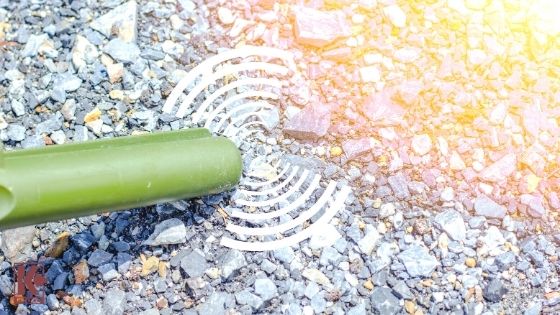
Detector Coil
The main elements of a metal detector include the body of the machine, a control box, and one or more search coils. It’s the coil that transmits an electromagnetic field into the ground. When that magnetic field encounters an object, it sends a signal to the coil and creates a sound. You can see the response on your screen as well.
Some detectors make a different sound depending on what type of object has been detected.
You can swap out a coil and replace it with one that is more sensitive or one that can search deeper. The larger the coil, the deeper in-depth it can detect, but it can also lose sensitivity to smaller objects. Smaller coils tend to have higher sensitivity but can’t detect as far down.
Each brand of metal detector markets its own coils, so best to purchase coils from the original manufacturer.
Detectors primarily use one of three technologies: Very low frequency (VLF), Pulse induction (PI), or Multi. Multi means you can hear more than one frequency at once.
VLF is like having a conversation with someone but with frequent interruptions. The VLF coil is the transmitter and the coiled wire is like an antenna that “sees” a target in the ground and amplifies the sound to let you know there is a signal.
A VLF machine will have two coils — the transmitter coil and the receiver coil. Electricity is sent to the transmitter coil, which is the outer loop, in one direction and then the other. Cheap metal detectors as well as other advanced metal detectors, work on the principle of transmitting a magnetic field and analyzing a return signal from the target and environment. The changing magnetic field causes electric currents to flow in metal objects.
Most machines use VLF technology.
PI works much differently. A transmit voltage is applied to a transmit coil, which then creates a transmitted magnetic field. When that magnetic field is suddenly turned off, the metal detector measures a received signal produced by a magnetic field from the environment.
Compared to VLF, PI is like a steady conversation. The PI coil is both the transmitter and receiver. It sends a constant signal to the ground without the interruptions that a VLF detector has.
Terminology & Definitions
Like every great hobby, metal detecting is an activity that is filled with special words that outsiders may have a hard time understanding. Here we will define some of the words you may not be very familiar with.
Metal detecting experts, feel free to skip ahead to the next section.

Metal Detecting In The Sunset
Ferrous: Metals that contain iron. Non-ferrous metals are metals that are not magnetic, like brass, gold, silver, nickel, tin, and lead.
Frequency: Frequencies vary on cheap metal detectors and the different frequencies are used for different types of detecting. The frequencies are measured in Kilohertz and measure the number of magnetic fields sent to the ground. Different metals react to different frequencies based on the characteristics and conductivity of that metal.
Mineralization: The amount of iron and salt in the ground. Examples of mineralized ground include black sand on beaches (from the iron), redness in the dirt (iron), and the salt in the sand on saltwater beaches.
Interference: Anything with an electromagnetic field, like cell phones or power lines, can interfere with the detector’s signal.
Control box: Contains the controls, speaker, batteries, and processor of a metal detector.
Search coil: This is what “sees” the metal in the ground. Different search coil sizes and shapes perform differently. Generally speaking, smaller coils are most sensitive while larger coils can penetrate deeper underground.
Discrimination: You can filter out different types of metal or objects by adjusting your settings.
Ground balance: Adjustments made to the detector for different types of soil and mineralization.
Evaluation Criteria for this Buyer’s Guide
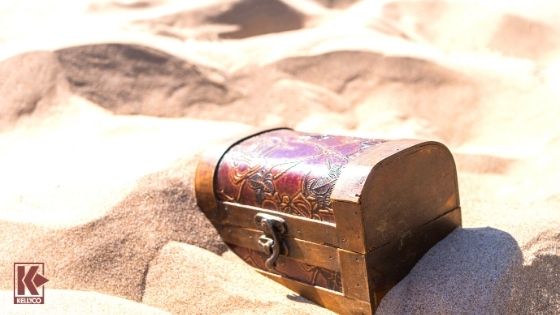
Treasure Awaits!
For this guide, we took a lot of different things into consideration. While basic things like weight, ease-of-use, and size are important, factors like the durability and reliability of the machine are too. The latter can be subjective, so we based some of it on customer reviews and physical features.
Does it have a warranty? What’s the price point? What do people say about it once they’ve used it? These are just some of the questions we tried to answer for you as you decide which of the cheap metal detectors will meet your needs.
Best Cheap Metal Detector for Coins, Rings, and Jewelry Detecting
If you’re coin hunting or looking for rings or other types of jewelry, search areas with high traffic. Parks, beaches, schools, churches, even sports and complexes, and bleachers are great places to look for things like this. Some of the very best locations for coin hunters are places that are abandoned today but were very busy in the past.
When you shop for a metal detector for coins, rings, or jewelry, choose one that’s easy to use and has good target separation or discrimination. That allows you to filter out what you don’t want. Parks mean you have a high chance of finding coins and jewelry, but these areas also have a lot of “junk” like foil and pull tabs.
Some machines include a feature called notch discrimination, which is very useful for this kind of hunting. That allows you to pick a target and filter out everything else that is outside that target’s feedback range.
Choose a machine with a frequency of 10-15 kHz and a depth range of 6-8 inches. Some of the best cheap metal detectors for coins, rings, and jewelry detecting are the Garrett ACE 400 or the Nokta Makro Simplex.
Garrett ACE 400
Our team of experts at Kellyco recommend the Garrett ACE 400 for this category. This detector features iron audio, a digital target ID and frequency adjust to help you dig more treasure and less trash. Five search modes are built into this detector, along with eight sensitivity settings that allow you to search in areas with high ground mineralization, near power transformers or close to radio signals.
The digital target ID on the Garrett ACE 400 helps you correctly identify which targets are made of what metal. The numbers are labeled 0-99, and they correspond with a list provided by Garrett that can be easily referenced to determine the metallic content of the target. It’s very versatile and can be used in many different terrains.
Price: $339.96
Weight: 2.8 pounds
Frequency: 10 kHz
Waterproof: Submersible coil only
Warranty: Two-year limited
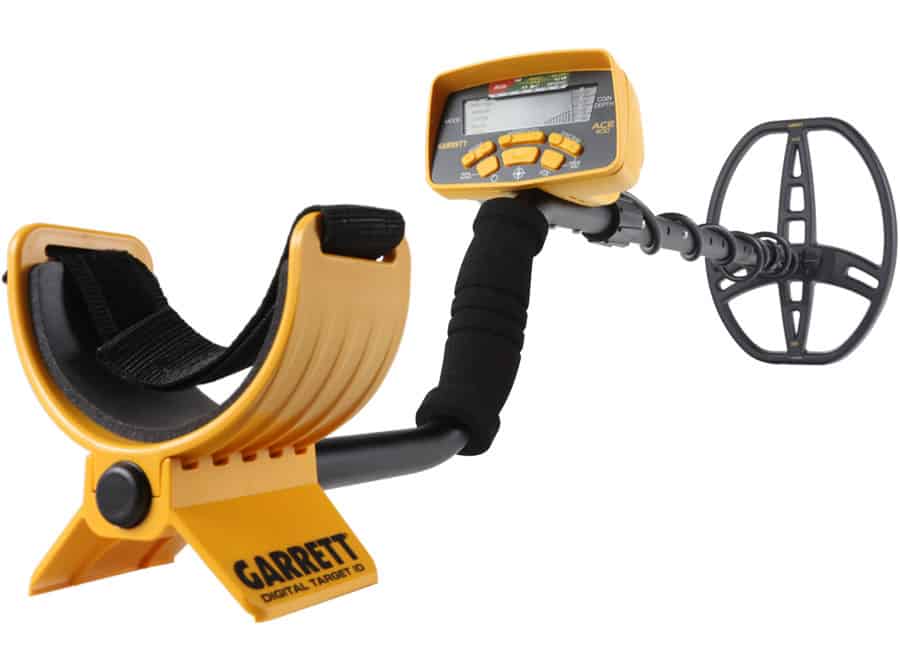
- Very easy to use, with an easy transition to upgrade to another Garrett
- It has the iron audio feature, like the AT Pro and AT Max
- Can be upgraded via Z-Lynk (Garrett’s proprietary wireless technology) for use with wireless headphones
- Not waterproof
- Not an effective small jewelry finder, due to lower operating frequency
- The headphones are basic. Consider an upgraded headphone package.
- Literally, ten minutes out of the box I had found an aluminum name tag and brass buckle in my backyard. I swung my other detector over this same area, many times before and never found anything. - Jeff
Runner up:
Nokta Makro Simplex
The Simplex is a simple, easy-to-use detector. It has an auto ground balancing and four preset search modes, including a beach mode. Includes an 11-inch search coil. The Simplex is fully submersible up to 10 ft. and has great lighting for nighttime and underwater use. It has great discrimination between metals. Features VLF technology.
- Weight: 2.9 pounds
- Frequency: 12 kHz
- Waterproof: Fully submersible up to 10 ft.
- Warranty: Yes
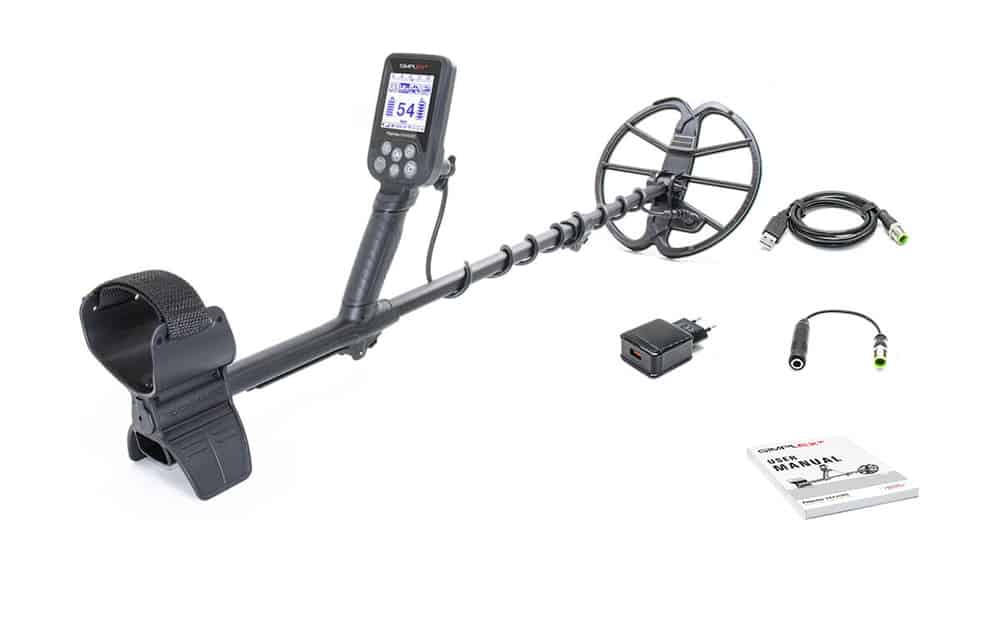
- Turn on and go
- No false signals
- Lightweight and well-balanced
- Very basic (no bells or whistles)
- Large coil
- Tones can seem amateur
- I recently tested the Simplex in an area where I have been detecting for the past three years. Without adjusting any of the settings, I took it out of the box, turned it on, plugged in the headphones and started detecting. The Simplex has an 11” coil, and I wasn’t expecting it to pick up much at this particular park because there is a lot of junk. I was very surprised at how clearly I could hear signals between trash. Within just a few hours, I found a wheat penny, a railroad spike and a brass buckle from the early 20th century. The buckle was buried 8 inches down. I have tendonitis in my elbow and swinging a detector for hours usually hurts, but after detecting for 3.5 hours, I had no issues whatsoever. This no-frills detector is an overachiever. - Carolyn Harwick
Best Cheap Metal Detector for Relic Hunting
Relics are a big draw for metal detecting enthusiasts. There are relics scattered across the world from past wars and other historical events, and it can be very exciting to uncover a colonial buckle or part of a musket. This is where metal detecting meets archaeology and true history buffs thrive!
The best places to search for relics include churches, old homesites, and areas where people used to congregate in the past. Think about abandoned train depots, large trees in the middle of town square — commonly referred to in the hobby as a money tree — and old steamboat landings.
To be an effective relic hunter, you’ll want a tough, rugged machine, because you can wind up pretty far off the beaten path.
The main features prized by relic hunters include good target separation. This is important because coins can be masked by old construction materials like nails or railroad spikes. Highly effective discrimination is important because you need to kill the audio for iron targets and focus on what’s valuable.
A good relic machine should have a depth range of 12-14 inches and use a frequency between 12-15 kHz. To be effective, you’ll probably want more than one coil. Coils that are a minimum of 12 inches wide allow you to detect at deeper depths, which is important when hunting for relics. Waterproof coils are an important feature to look for as well because you never know what terrain you’ll encounter when you’re out looking for historical locations deep in the woods.
A machine that has a true all-metal mode or zero discrimination is useful if you’re not on an old homesite because many Civil War relics tend to ring up as iron. Horseshoes, railroad spikes and shell fragments would be not be heard, for example, if your discrimination settings are too high.
Many top-performing relic machines are fairly heavy, so consider a harness or guide to help you distribute the weight.
Minelab Vanquish 340
We recommend the Minelab Vanquish 340 for this category. The Vanquish is Minelab’s newest metal detector and features the combined power of multiple detectors in one. It includes a 12-inch coil, a customizable frequency range settings and a red LED backlight. The Vanquish is available in other models as well, including the 440, 540 and Pro Pack.
Price: $199.00
Weight: 2.6 pounds
Frequency: Multi IQ
Waterproof: Submersible coil, submersible up to 3.3 ft.; water resistant with optional rain cover
Warranty: Two-year limited
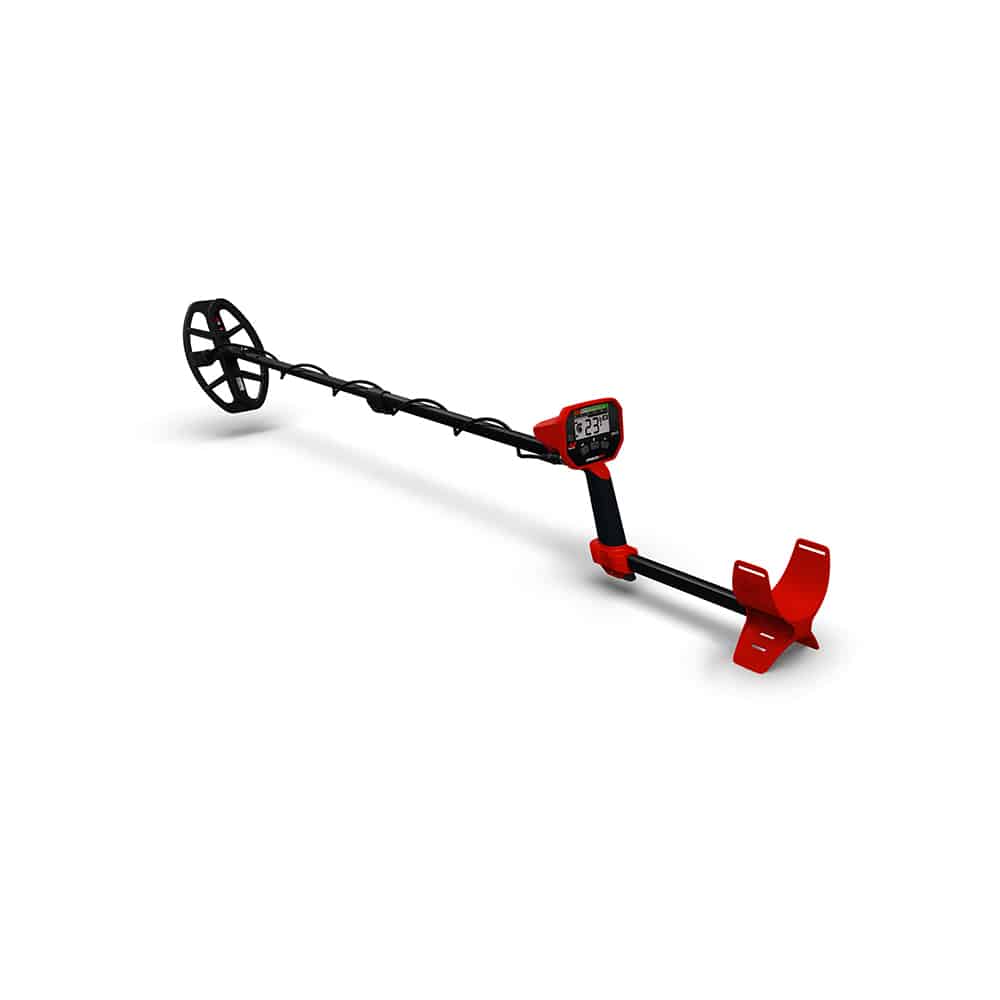
- Very affordable
- Great for beginners
- Features Multi-IQ technology
- No frills
- Will update as the reviews come in!
- No reviews yet! Available for pre-order now. -
Runner-up:
Garrett Ace 250
The Garrett ACE 250 is an outstanding detector for relic hunting. It’s easy to tune and easy to use and is recommended for both beginners and pros. While this is an all-purpose metal detector, it does well with relics.
Price: $212.45
Weight: 2.7 pounds
Frequency: 6.5 kHz
Waterproof: Not waterproof
Warranty: Two-year limited
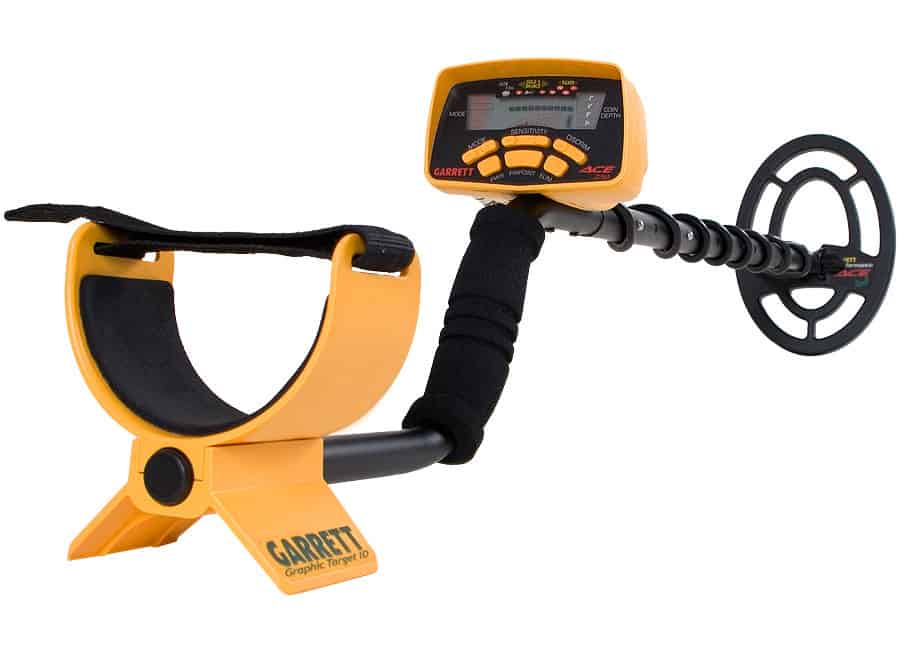
- Very easy to use
- Lightweight
- Target ID has high reliability
- Not waterproof
- Not an effective finder of smaller items
- Search coil is small but can be swapped out with a larger one
- The ACE 250 is a great entry level detector to get into the hobby. It gets deep, and the coil makes pinpointing a breeze… I’ve found many coins, rings and relics with it and just love that bell sound when it finds silver! - Woody
Best Cheap All-Purpose Metal Detector
All-purpose metal detectors can be used pretty much anywhere and in most conditions. These machines are often the choice made by detectorists who are looking for a workhorse to do more than one job. They’re also a good fit for beginners since you can use them in different types of terrain.
These machines can be outperformed by the best-in-class machines described in the various categories above. However, because they are highly capable machines that have a “do-anything” attitude, they are often the first purchase (and sometimes only purchase) by thousands and thousands of metal detectorists across the country.
This category of cheap metal detectors represents many of our best sellers. Think of these as go anywhere, do anything machines. They are the utility infielder of the metal detecting world. They are the Magic Johnsons of the metal detecting world. If Chevrolet made a Corvette SUV it would fall into this category.
Garrett Ace 300
The Garrett ACE 300 is our pick for this category. This metal detector was built with five separate search modes to look for coins, jewelry and relics. Like the ACE 400, the ACE 300 allows you to adjust the frequency of the detector for ground mineralization, which allows you to shy away from trash iron.
It includes sharp and responsive audio with pulse-width modulation and features a coin depth detector. Accessories include a coil cover, arm rest strap and 7X10 PROformance search coil, as well as headphones.
Price: $254.96
Weight: 2.8 pounds
Frequency: 8 kHz
Waterproof: Not waterproof; includes rain and dust cover
Warranty: Two-year limited
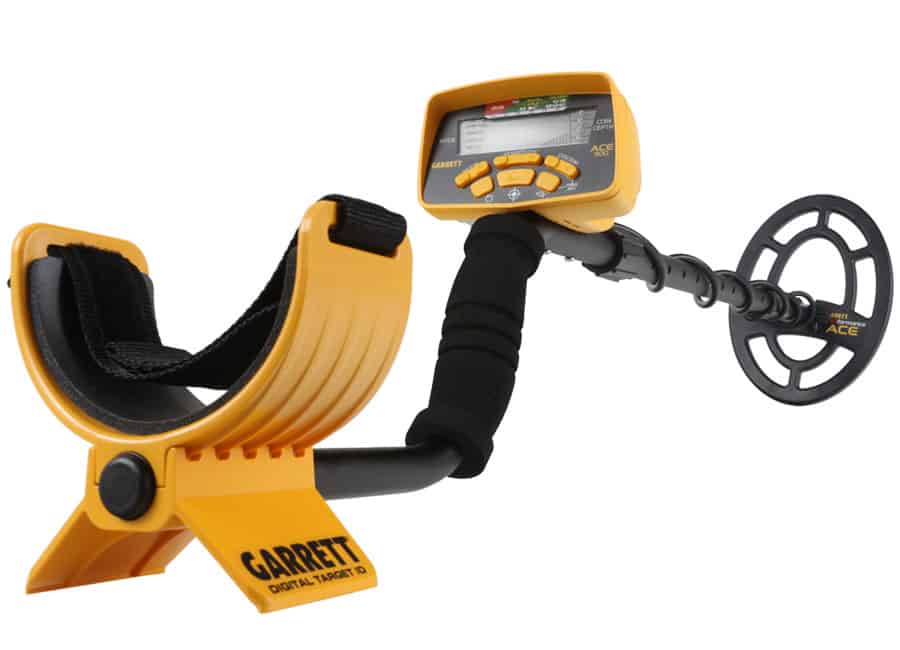
- Easy to operate
- Lightweight and sturdy
- Headphones have adjustable volume
- Not waterproof, but does well in wet beach sand
- Not an effective finder of smaller jewelry, due to lower operating frequency
- Search coil is small but can be swapped out with a larger one
- I was amazed at its powerful performance. In just an hour, I dug several coins out of our yard, as well as an 81 millimeter mortar bomb that was buried about 10 inches deep. - Julieto
Runner-up:
Striker Detectors z60 Metal Detector
Nokta Makro Simplex
Best Cheap Metal Detector for Underwater Detecting
Underwater metal detecting takes this hobby to a different level. Whether you’re scuba diving with a detector or walking along the beach, having a fully submersible metal detector is important. If you’re already an avid scuba diver, taking a metal detector along adds another element that could even help you find real treasure! Even if you’re a beginner, you won’t have any trouble using these detectors.
Nokta|Makro Pulsedive Scuba Detector
We recommend the Nokta|Makro Pulsedive Scuba Detector for this category. It’s a scuba detector and pinpointer in one! It uses PI for stable operation in any water or soil. Dive mode provides easier operation under water by locking the keys and preventing them to be pressed by water pressure while deep diving, and an attached LED flashlight allows you to easily see your target at night or underwater.
Price: $160.65
Weight: 14.8 oz
Frequency: 3 kHz
Waterproof: Waterproof up to 200 ft.
Warranty: Two-year
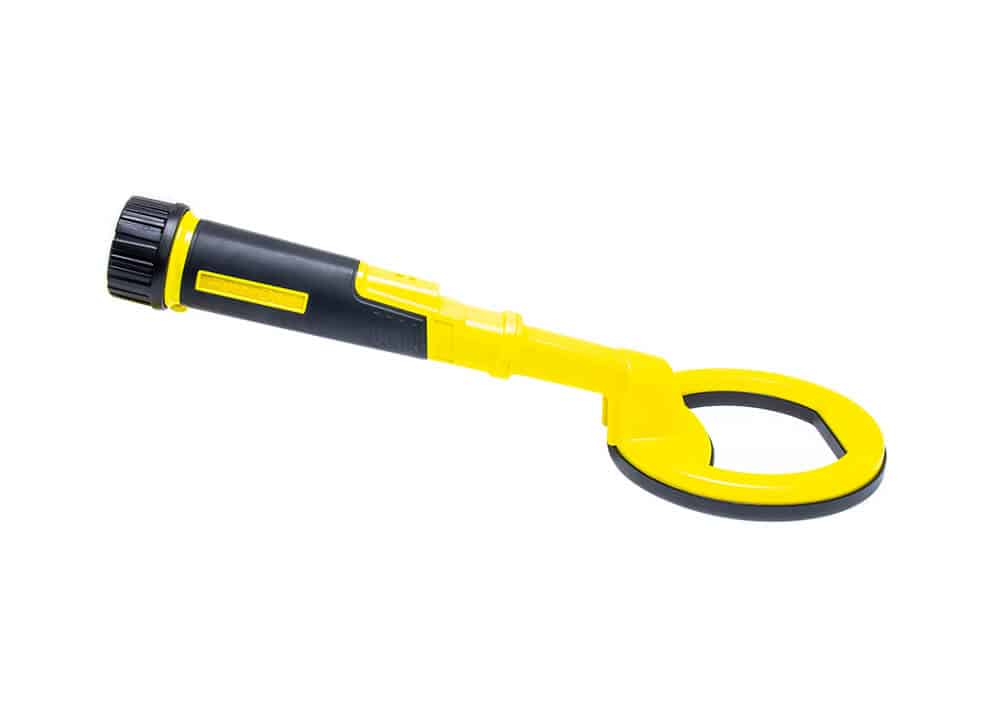
- Great for scuba diving
- Stable operation in saltwater and any soil
- Locks keys underwater and prevents them from being pressed by water pressure while deep diving
- Not as sensitive to small targets as higher end options
- Not great for gold
- Takes two hands to change sensitivity
- Finally an affordable unit, which is actually two units in one! - Paul
Runner-up:
Quest Scuba Tector
The Quest Scuba Tector is great for underwater diving, beach detecting and general metal detecting. It features PI technology and can be submerged up to 200 feet. It also includes an LED flashlight, lost alarm, a lanyard attachment loop cap and performs well in salt water.
Price: $179.99
Weight: 11.7 oz.
Frequency: PI technology
Waterproof: Fully submersible up to 200 feet
Warranty: Limited
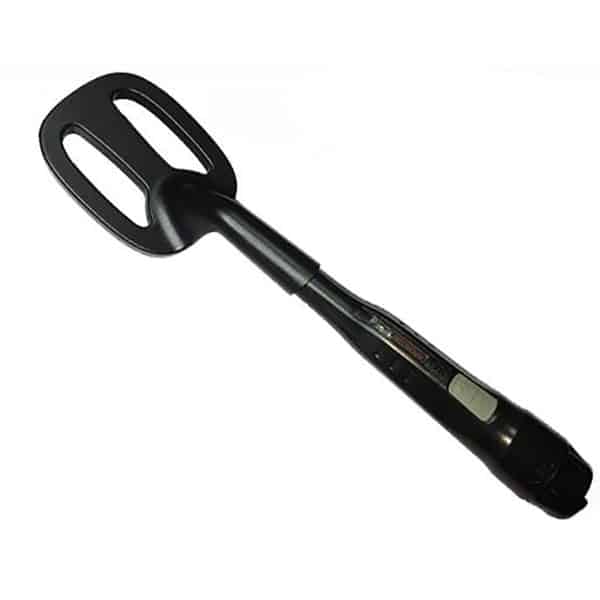
- High level of sensitivity and penetration depth
- Rechargeable battery
- Light weight
- All warranties void if electronic parts are opened
- Doesn’t do well with small gold nuggets
- Occasionally needs recalibration
- I was surprised at the depth and sensitivity. Very happy! - antigrav1117
Best Cheap Metal Detector for Saltwater and Beach Detecting
Beaches are one of the best places to metal detect because of their popularity. People lose all kinds of things at the beach, and, of course, things wash up on the shore, too. Beaches are especially known for “fresh drops.” Imagine a beach filled with hundreds of people each day being tossed around by waves and slathering their bodies in sunscreen. It’s a perfect storm for finding gold rings and chains.
Being able to manually adjust ground balance is important when you’re detecting at the beach. Saltwater affects cheap metal detectors in the same way highly mineralized soil does. It becomes difficult to focus on valuable items when those items are surrounded by so much potential noise. A multi-frequency detector will be very useful because the ground is continuously changing at the beach, from dry sand to wet sand to surf. Ground tracking is another important feature so that the machine itself can detect what kind of soil or sand conditions you’re on as you hunt.
Beach detectors need to be waterproof. A wave could knock you down while detecting and ruin any machine that is not waterproof.
Garrett ACE Apex Metal Detector
The Garrett ACE Apex Metal Detector is a great option for an affordable metal detector at the beach. This machine has a waterproof coil and a rainproof control box, an adjustable armrest, and a high-resolution ground balance. The new technology design of this machine will also allow you to switch back and forth between single and multifrequency.
- Weight: 2.5 lbs
- Frequency: 5, 10, 15, 20 kHz, Multifrequency, Multisalt
- Waterproof: Waterproof search coil; Rainproof control box
- Warranty: Yes
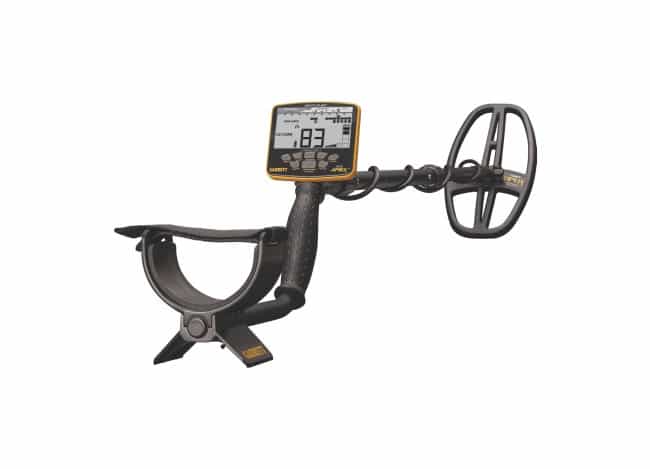
- Can be used in various mineralization conditions
- High-resolution ground balance
- Multi-Frequency Technology
- Adjustable armrest
- Control box is not waterproof
- Does not come with an armrest strap
- No adjustable shaft
Runner-up:
Minelab Vanquish 540 Pro-Pack
Our team also recommends the Minelab Vanquish 540 ProPack metal detector for beaches. The ProPack has two coils — an 8” and 12” for greater depth and precision. The coils are waterproof up to 3.3 feet, and the control pod is water-resistant with an included rain cover.
- Weight: 2.8 lbs.
- Frequency: Multi-frequency
- Waterproof: Coils are waterproof up to 3.3 feet
- Warranty: Two-year limited
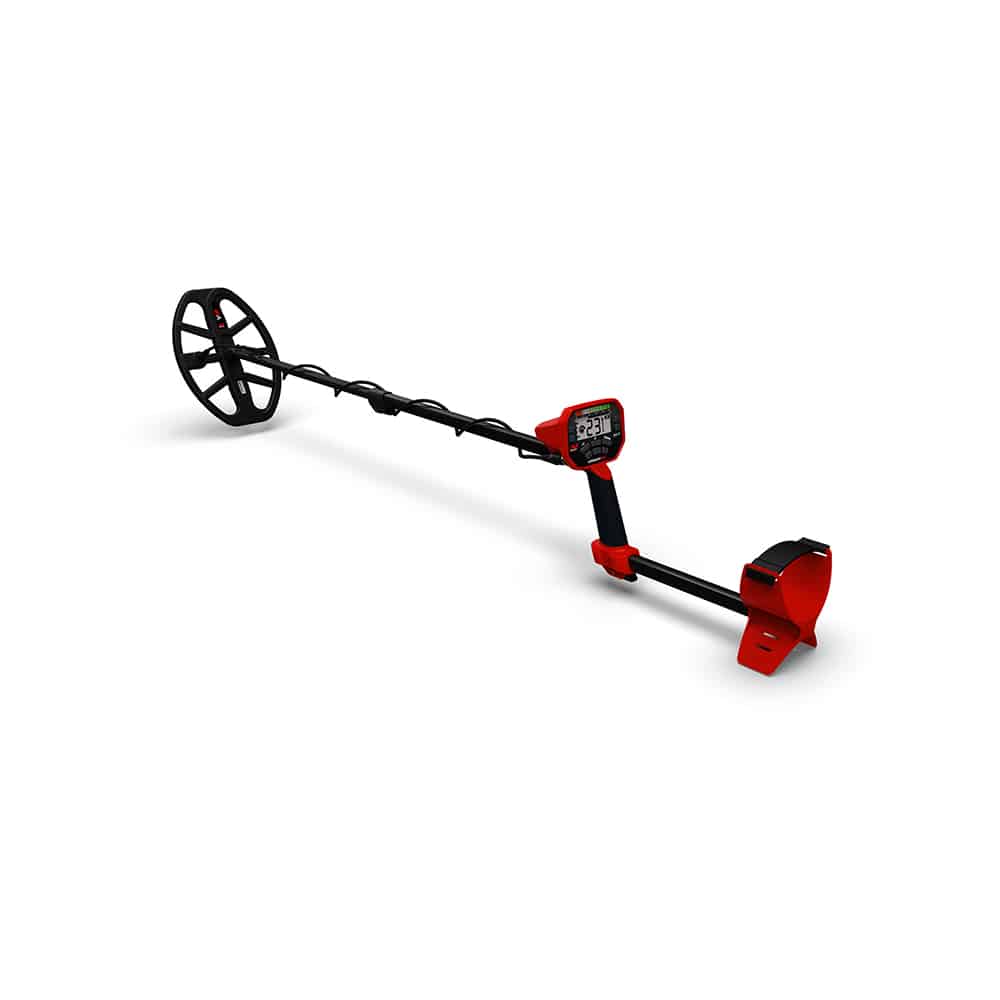
- Comes with two search coils
- Multi-IQ tech
- Great for every type of soil
- More expensive than the basic model
- Will update as more reviews come in!
- No reviews yet! Taking preorders only. -
Best Cheap Metal Detector for Detecting Gold
Panning for gold or using a pickaxe for hours on end isn’t necessary anymore if you use a metal detector. Detectors made specifically for gold hunting make the hobby a whole lot easier. Visit mountains or areas like rivers, streams, and exposed rock bed to increase your chances of finding gold, especially in the western U.S.
Look for a metal detector that works well in highly mineralized soil. A frequency of 20 kHz or higher is great for gold. You’ll also want a waterproof coil, but the machine itself doesn’t need to be waterproof. As with relic hunting, a harness or guide will be helpful to distribute the weight of heavier machines, since finding gold can take a long time.
One of the most important features in a detector used for gold hunting is that it is stable — meaning less noisy — in mineralized ground. Soil out west has a lot of iron ore that will interfere, so having a detector that can find a gold nugget that’s surrounded by iron ore is really important.
Nokta Makro Gold Racer Pro Package Metal Detector
Our top choice is the Nokta Makro Gold Racer Pro Package Metal Detector. It’s great for beginners, coins, gold, and relics. This machine also features the iMack technology which eliminates false signals caused by ground noise or hot rocks when searching in discrimination modes.
- Weight: 3 lbs
- Frequency: 56 kHz
- Waterproof: 5″ Waterproof DD Search Coil
- Warranty: 2 Year
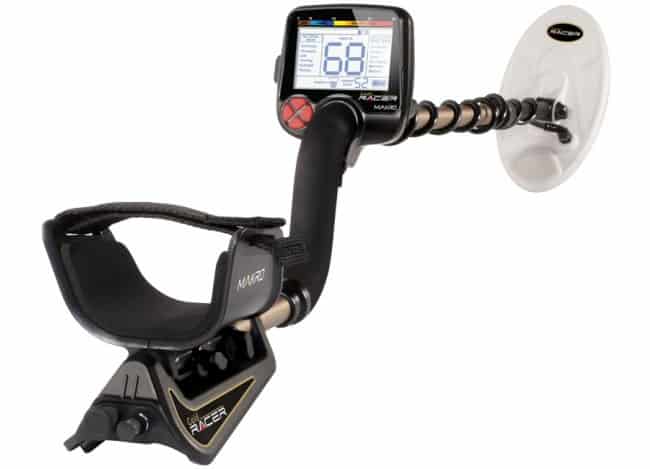
- 56kHz search frequency
- Waterproof search coil
- Excellent discrimination
- Features iMask (Intelligent Masking)
- Headphones are not Bluetooth compatible
- No vibration mode
- No GPS
Runner-up:
Fisher Gold Bug Pro
The Fisher Gold Bug Pro features high sensitivity to small gold nuggets, but this detector also works well as an all-purpose metal detector. The coil is 5 inches, making it perfect for small gold, but you can also fit it with an 11 inch DD search coil.
Price: $549
Weight: 2.5 lbs.
Frequency: 19 kHz
Waterproof: No
Warranty: Five-year
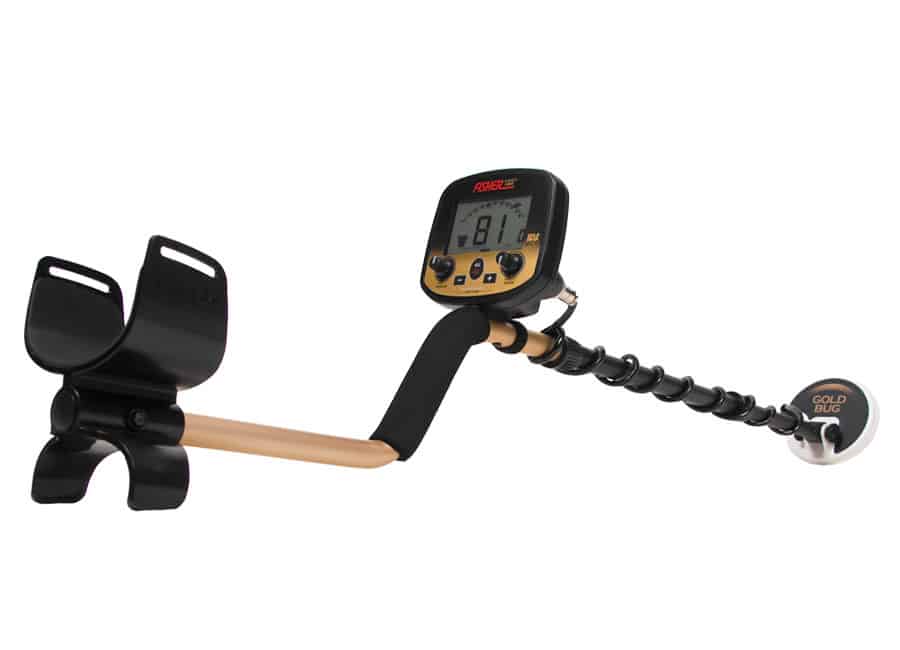
- Can change modes to detect other objects
- Lightweight so you can hunt for hours
- Small coil is perfect for small gold
- Can be hard to decipher tones
- No arm strap included
- May need to purchase additional coil for other targets
- I live in Alaska and the first time out, it located a small nugget. Easy to use and very sensitive. It's also very light and won't wear your arm out like other detectors. - Colin
Final Word
We hope this guide helps you decide which cheap metal detector is best for you. There are many things to take into consideration, including where you will use your metal detector and what you’re looking for.
In our experience, once you start metal detecting, you never want to stop. There are so many different adventures you can experience with a metal detector. Visit our Treasure Finds page to read about all the different items our customers have found over the years. Our customers range from beginners all the way to professionals!
If you have more questions after reading this guide, please feel free to give us a call or pop open the chat window on our website.
